Click on images to enlarge
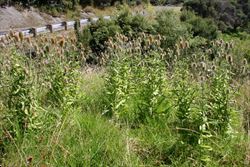
infestation (Photo: Trevor James)
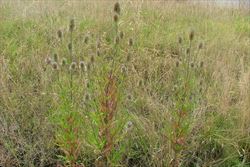
habit (Photo: Sheldon Navie)
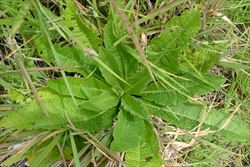
basal rosette of large lower leaves (Photo: Sheldon Navie)

prickly branched stems and paired upper leaves (Photo: Sheldon Navie)

elongated upper leaf (Photo: Trevor James)

close-up of prickly stem and leaf underside (Photo: Sheldon Navie)

young flower cluster subtended by several elongated bracts (Photo: Trevor James)
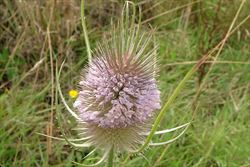
flower cluster in flower (Photo: Sheldon Navie)
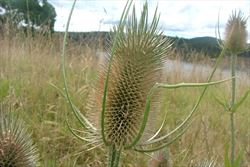
immature seed-head (Photo: Sheldon Navie)
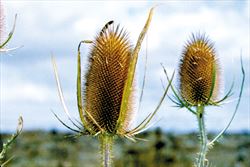
mature seed-head (Photo: Rob and Fiona Richardson)
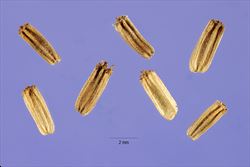
close-up of seeds (Photo: Steve Hurst at USDA PLANTS Database)
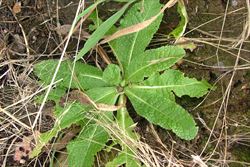
young plant (Photo: Sheldon Navie)
Scientific Name
Dipsacus fullonum L. subsp. fullonum
Synonyms
Dipsacus sylvestris Huds.Dipsacus fullonum L.
Family
Dipsacaceae
Common Names
common teasel, Fuller's teasel, teasel, wild teasel, wild teazel, wild teazle
Origin
Native to northern Africa (i.e. northern Algeria, Morocco and Tunisia), Europe (i.e. Ireland, UK, Austria, Belgium, Czechoslovakia, Germany, Hungary, the Netherlands, Poland, Switzerland, Albania, Bulgaria, Greece, Italy, Romania, Yugoslavia, France, Portugal, Spain, Moldova and Ukraine) and western Asia (i.e. Lebanon, Syria and northern Turkey).
Naturalised Distribution
Widely naturalised in south-eastern Australia (i.e. on the central and southern tablelands of New South Wales, in southern and eastern Victoria and in Tasmania).
Naturalised overseas in southern Africa, New Zealand, USA and South America.
Notes
Wild teasel (Dipsacus fullonum subsp. fullonum ) is regarded as an environmental weed in Victoria and Tasmania. While it is mainly a weed of pastures and roadsides, it sometimes also grows in natural communities and forms a large basal rosette of leaves in the early stages of growth. This rosette of leaves can cover a large area and shade other ground-dwelling plants nearby.

